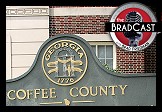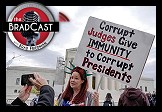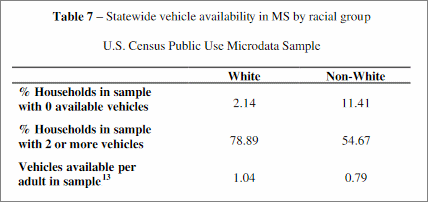READER COMMENTS ON
"Mississippi's Passage of Polling Place Photo ID Law Reveals Still-Burning Vestiges of Jim Crow"
(13 Responses so far...)
COMMENT #1 [Permalink]
...
Mary McLaurin
said on 1/14/2012 @ 10:33 am PT...
Brad,
You will be happy to know that multitudes of black Mississippians signed the petition for Voter ID. I went door to door to get signatures and many blacks feel that it is the only way to stop voter fraud. I heard them tell stories of instances where parents or grandparents voted in elections that were well over 100 years old and had been dead for years. Mississippi has had 38 confirmed cases of voter fraud according to Democrat Attorney General Jim Hood. One case netted a black Tunica women in jail for 5 years this year. She voted for a mentally disabled young man (also black). He testified against her saying "it was not nice of her to take his vote like that". I work with the poorest of the poor in Mississippi and have never found that people lack ID's. I am not sure where people are getting that information. 22% of Mississippians live at or below the poverty level and depend on Social Services like Social Security Disability, Social Security, SSI, Food Stamps, TANF, Child Support, HUD Section 8 Assistance, USDA Rural Development programs to exist. All of these programs including bedding down in a homeless shelter require a photo or state issued ID. If they are on welfare of any type they have an ID. If they don't have an ID DHS usually assists them in getting what they need. I work with the chronic homeless, elderly and disabled low and very low income individuals. I don't think you will have this problem in Mississippi. I wish that you would not make race a factor for people in Mississippi wanting voter ID.
COMMENT #2 [Permalink]
...
Ernest A. Canning
said on 1/14/2012 @ 11:21 am PT...
Mary McLaurin @1 wrote:
Mississippi has had 38 confirmed cases of voter fraud according to Democrat Attorney General Jim Hood
Interesting, that would be four times the amount documented for the entire nation! Do you have a link for this remarkable figure as opposed to your anecdotal "parents or grandparents voted in elections that were well over 100 years old"?
But then, perhaps you are unaware of the only type of voter fraud that can be prevented by polling place photo ID laws --- in person impersonation.
Cases do exist where someone has fraudulently cast an absentee ballot, e.g. Lessadolla Sowers was convicted for fraudulently casting absentee ballots. However, that type of fraud would not have been prevented by a polling place, photo ID law. (I suspect the case you referred to of a woman casting a ballot for a nephew entailed absentee voting as well).
Likewise, your assertion that you personally gathered signatures by blacks who had been taken in by the GOP voter fraud canard does not explain away the 75% of non-whites who voted against the measure as compared to 82% of whites who did.
What is your explanation, Mary, for that stark disparity?
COMMENT #3 [Permalink]
...
Brad Friedman
said on 1/14/2012 @ 1:46 pm PT...
Mary McLaurin @ 1:
I'm going to do you the favor of presuming you actually believe the things you said in your response above --- as opposed to simply posting it here as the misleading disinformation that it is --- and will respond on that good faith basis...
You will be happy to know that multitudes of black Mississippians signed the petition for Voter ID. I went door to door to get signatures and many blacks feel that it is the only way to stop voter fraud.
Yes, many blacks actually have access to the same public airwaves and propaganda that white people do these days. I'm sure some believe, or rather "feel" that is "the only way to stop voter fraud". They would be as wrong as you are.
Mississippi has had 38 confirmed cases of voter fraud according to Democrat Attorney General Jim Hood.
I notice that nowhere in your post did you include any cites to the information you proffered. No links to back up any of your assertions with evidence. But, as I'm a swell fellow, I'll help you.
The Republican National Lawyers' Association (RNLA) has been the group fronting (lying about) the phony "voter fraud" epidemic for years. They have put together a web page called "Voter Fraud: The Evidence" in order to support their assertion that Photo ID is necessary to stop this pernicious menace.
Their page claims "Vote Fraud is All Over the Map" and then it lists, in handy form, "vote fraud convictions or prosecutions in the last decade" for each state. Here's what they list for Mississippi:
Now, with 11 names listed there (not "38"), you'll note that 5 of them link to the same news article, as they were busted as part of a single fraud conspiracy.
So, of all of those listed above --- or of any other of those "38 confirmed cases of voter fraud" you site (without linking) --- which of them would have been prevented by polling place Photo ID restrictions of the type approved by white voters in November and wildly disapproved by non-white voters in the same election?
(Here's a hint: None of them would have been prevented by polling place Photo ID restrictions, as they were all absentee ballot fraud, most of which included legal voters who were inappropriately encouraged to vote by someone alleged to have offered them something in return. That's called "vote buying", and polling place Photo ID restrictions have no affect on such a crime. But I'm happy for YOU to help me see which of them would have been prevented by polling place Photo ID restrictions....I'll be waiting!)
One case netted a black Tunica women in jail for 5 years this year. She voted for a mentally disabled young man (also black). He testified against her saying "it was not nice of her to take his vote like that".
Yes, it was "not nice". It was also highly illegal for Lessadolla Sowers in Tunica (whose crimes we reported on in August of 2011) to commit 10 counts of absentee voter fraud. Please let me know which of them would have been prevented by polling place Photo ID restrictions. ... I'll be waiting! Thanks!
I work with the poorest of the poor in Mississippi and have never found that people lack ID's. I am not sure where people are getting that information.
Well, then, I'm happy to help. Here's just some of the places "where people are getting that information".
A 2008 survey [PDF] --- created by a PRO Photo ID commission (created expressly to make the case for polling place Photo ID requirements) -- found that in Mississippi, 3.8% of registered African-American voters had no driver's license or passport or other form of government-issued ID, while the study also founding that 0% of registered Whites have that problem.
While I find it a bit difficult to swallow that 100% of whites have the type of photo ID that would be required by Mississippi's polling place Photo ID restrictions (and that only 3.8% of Blacks are lacking it), we'll just stipulate, for now, to the numbers above (since they come from a pro-Photo ID restriction outfit), which show that 3.8% of legally registered African-American voters could be disenfranchised by this law versus 0% of white voters.
That study, as noted, was from a rightwing-created commission. But what does the U.S. Census data tell us?
According to the study released last week by the Lawyer's Committee for Civil Rights Under Law which attempted to discern why more than 83% of Whites would favor such a law versus 75% who oppose such a law in MS, U.S. Census data on vehicle ownership may provide another clue.
As the Lawyer's Committee notes....
Hmm...Non-Whites households are some 500% more likely to have no vehicle than White households. I wonder if there's any correlation to having a driver's license in those households.
Now, do you have evidence (actual verifiably empirical evidence, like an official study, as opposed to your own anecdotal opinion) to show that either of the above statistics and studies, the first from a pro-Photo ID group, the second from an anti-Photo ID group, are inaccurate? I'm happy to look at those studies if you do.
Back to your comments...
22% of Mississippians live at or below the poverty level and depend on Social Services like Social Security Disability, Social Security, SSI, Food Stamps, TANF, Child Support, HUD Section 8 Assistance, USDA Rural Development programs to exist. All of these programs including bedding down in a homeless shelter require a photo or state issued ID. If they are on welfare of any type they have an ID. If they don't have an ID DHS usually assists them in getting what they need. I work with the chronic homeless, elderly and disabled low and very low income individuals. I don't think you will have this problem in Mississippi.
Your unsupported personal opinions based on your experience are welcome, but they have nothing to do with actual facts. If you have actual evidence to back up your claims, I'm sure you will link to it shortly. I also have no idea if the programs you mentioned above either require a Photo ID, whether or not the type of ID they require (if any) would be allowable for voting under MS' new law, or, if so, how many still lack such Photo ID. How many legal voters are you comfortable with denying their right to vote before you see this as a problem? 1? 1,000? 250,000? Please let me know what an acceptable rate of disenfranchisement under this law would be for you.
I wish that you would not make race a factor for people in Mississippi wanting voter ID.
You may "wish" whatever you want. However, we did not "make race a factor for people in Mississippi wanting voter ID," the voters of Mississippi did when Whites voted overwhelmingly in favor it and Blacks voted overwhelmingly against it, according to the independent study referenced in Ernie's article above.
As you've made a lot of so-far unsupported assertions in your comment, I've asked you to support those assertions in kind. Short of that, we'll be left to presume you don't have a clue what you're talking about. So please feel free to let me know where I'm wrong.
I'll be waiting.
COMMENT #4 [Permalink]
...
Ernest A. Canning
said on 1/14/2012 @ 2:15 pm PT...
Not only is it of interest to note that none of the documented cases cited by Brad @3 entailed "in person impersonation" which is the only form of voter fraud that can be prevented by photo ID, but that the total number (11) occurred in multiple elections covering a period of eight years.
In fact, neither Brad nor Mary cited a single case of in person impersonation ever occurring in Mississippi. Absent a showing of such a documented case, polling place photo ID amounts to a solution to a problem that has never existed in MS.
I have not located a number of total votes cast in MS in those eight years, but I suspect it would be well into the millions --- a number that would expose just how rare even absentee voter fraud is.
COMMENT #5 [Permalink]
...
Mary McLaurin
said on 1/15/2012 @ 7:35 am PT...
In November of 2010 I hired 220 pollwatchers working in various precincts in Hinds, Madison, Issaquena, Washington, Lafayette, Yazoo, counties. There were 5 attempts of documented impersonation (3 separately and 2 by the same individual)at various precincts all were thwarted at the precinct level and the individuals left the precinct before voting. In each incident the individual attempting to vote could not produce an address that matched the name provided. One individual that I was called about was a man dressed up like a woman that atttempted to vote in two separate princints in Hinds County. Attentative pollwatchers and pollworkers noticed that something did not appear right and asked the individual twice for his/her address. He fled the precinct only to return to a neighboring precinct. I have personally witnessed a man entering a precinct wearing an "I voted" lapel sticker on his shirt. I was notified by the Baliff that he was attempting to vote and I questioned him asking "Sir, can I help you?" He commented that he wanted to vote. I asked "Sir, haven't you already voted?" He then fled the precinct. We took down his tag number and vehicle description and turned it in to the sheriff's Department. Nothing ever came of it because according to officials he did not committ voter fraud only attempting. I doubt seriously if either of you are from Mississippi and have only liberal leaning statistics or polls to depend on. I invite you to come down to Mississippi and spend one week with me and I will take you to the areas that would remind you of a third world country and you will see extreme poverty dependent on Government assistance. Most of the very poor have to have a Birth Certificate and Social Security card within the first year to qualify for this assistance. If you want to take me up on it my e-mail is marymclaurin@rocketmail.com. P. S. I am really a nice person that believes that just because we disagree with each other doesn't mean you are a bad person. I will get you the facts from our Secretary of States Office and Attorney General's Office and post them soon.
COMMENT #6 [Permalink]
...
Ernest A. Canning
said on 1/15/2012 @ 9:06 am PT...
Mary McLaurin @5 wrote:
In November of 2010 I hired 220 pollwatchers working in various precincts...
On whose behalf did you do the hiring, Mary? Are you affiliated with the GOP? If so, what is your official position?
Mary alleges:
There were 5 attempts of documented impersonation (3 separately and 2 by the same individual)at various precincts all were thwarted at the precinct level and the individuals left the precinct before voting. In each incident the individual attempting to vote could not produce an address that matched the name provided.
Not sure what you mean by "documented," but what becomes abundantly clear is that, per your allegations, every one of these alleged in person voter impersonations was thwarted without the need for photo ID.
Still awaiting a link to a documented "conviction" for in person impersonation voter fraud at any time, anywhere in the history of the Magnolia state.
COMMENT #7 [Permalink]
...
Brad Friedman
said on 1/16/2012 @ 12:03 am PT...
Mary McClaurin @ 5:
Just FYI, it'd be easier to read your remarks if you hit ENTER twice to make paragraphs every now and again. In any case...
I note that after all the time I spent courteously offering links and details in my reply, you didn't rely to any of them. Nor did you either bother to answer any of my questions or supply the requested links to support your assertions.
I look forward to your doing so, as well as answering Ernie's questions above. Thanks in advance!
As to a couple of points he didn't speak to in his reply...You said...
There were 5 attempts of documented impersonation (3 separately and 2 by the same individual)at various precincts all were thwarted at the precinct level and the individuals left the precinct before voting. In each incident the individual attempting to vote could not produce an address that matched the name provided.
Glad to hear the deterents already in place in Mississippi seem to be working without having to deprive anybody of their constitutional right to vote.
I doubt seriously if either of you are from Mississippi and have only liberal leaning statistics or polls to depend on.
Just as I feared. You didn't bother to read the detailed reply I had the courtesy to give you. Please go back and do so, and you will note that I cited two different studies, the first of which was from a Rightwing commission (put together by the Republicans behind the entire push for Photo ID restrictions, as led by James Baker III, as well as the general counsel for Bush/Cheney '04 Inc.)
So, no, Mary, that's not a "liberal leaning statistic or poll" I am depending on.
I invite you to come down to Mississippi and spend one week with me and I will take you to the areas that would remind you of a third world country and you will see extreme poverty dependent on Government assistance.
I have seen some of it and yes, you are right. It's horrible. It's a shame the white voters of Mississippi have chosen to spend money to keep those people from voting rather than using it to help improve their lives.
Most of the very poor have to have a Birth Certificate and Social Security card within the first year to qualify for this assistance.
That's nice. And how many don't? As I asked you previously in the reply you didn't have the courtesy to respond to, "How many legal voters are you comfortable with denying their right to vote before you see this as a problem? 1? 1,000? 250,000? Please let me know what an acceptable rate of disenfranchisement under this law would be for you."
P. S. I am really a nice person that believes that just because we disagree with each other doesn't mean you are a bad person.
Nobody said you were a bad person. But you'd help make your case a lot more affectively to that end if you were nice enough to respond to the notes that have been posted to you here.
I will get you the facts from our Secretary of States Office and Attorney General's Office and post them soon.
We will be eagerly looking forward to them. Though why weren't they available BEFORE you voted to potentially disenfranchise thousands of voters in Mississippi?
COMMENT #8 [Permalink]
...
Mary McLaurin
said on 1/16/2012 @ 11:54 am PT...
Where do you live Brad? Just curious. Like to know who I writing to? I wish that you were just as passionate about helping the "potentially disenfranchised" in helping them gain ID's to help them gain benefits that would help them. You only appear to be worried about their right to vote. I don't hear any outcry about the same people not getting Social Security, SSI, HUD assistance, Food Stamps, TANF, Homeless Shelters, etc because they cannot get an ID. Interesting.
Beginning of a new paragraph just for you! Still waiting for your e-mail. When do you have have time to come down to Mississippi? I will take you to places that you won't believe.
I will get you the information you are requesting. I need to file a public records request first. I want to give you the real statistics not information from 2004. I will also give you some election reports from our Circuit Clerk. It is a Federal and State Holiday. Have a nice afternoon.
COMMENT #9 [Permalink]
...
Another Halocene Human
said on 1/16/2012 @ 12:11 pm PT...
I have met destitute whites in Florida without birth certificate, due to intra-family issues. Getting a duplicate issued is non-trivial. But say you had one. A working person could potentially spend all day at the DMV on a work day and be out of pocket $20-30 to get their "walking license" (state-issued ID/non-driver's license). In Florida because of some federal legislation it is now much, much tougher to get your photo ID. Even five years ago, the state used to offer alternatives for the very poor who did not have these proper documents.
Many elderly natives of the South do not and have never had birth certificates, and without this document, states will no longer issue photo ID.
All of this is intended to throw down multiple logistical, bureaucratic, and monetary barriers to voting.
I find it ironic that Mary goes on about birth certificates and social security cards, neither of which are photo IDs.
I also find it insulting that she repeatedly harps on government assistance but neglects the working poor--the class who already find it most difficult to access the polls.
Mary may bring up the I9 work authorization form, but as a US Citizen, I have been hired and employed without ever having to produce my actual docs! That was private sector; in public sector they check your docs. Got around that in public sector once by working under the table (paperwork said I was someone else). And none of this was an attempt to defraud, cheat taxes, or skirt the law, just laziness/expediency/convenience. Bottom line, a poor person may easily find an employer who waives photo ID (btw, you can have a SSC without birth certificate or state ID because your parents obtain that for you due to 1980's changes in tax law). The notion that you would be stopped in your daily endeavors long before voting day without that ID is ludicrous.
COMMENT #10 [Permalink]
...
Brad Friedman
said on 1/16/2012 @ 12:53 pm PT...
Mary said @ 8:
Where do you live Brad? Just curious.
Now, Los Angeles.
I wish that you were just as passionate about helping the "potentially disenfranchised" in helping them gain ID's to help them gain benefits that would help them.
I'm passionate about protecting their right to vote. Ensuring they have the right to vote is (or, at least should be) the most important thing towards helping them ALL out of the poverty they have been allowed to live in.
You only appear to be worried about their right to vote. I don't hear any outcry about the same people not getting Social Security, SSI, HUD assistance, Food Stamps, TANF, Homeless Shelters, etc because they cannot get an ID. Interesting.
I can't cover everything, Mary. If you read some of the work we've done here for the last 8 years or so, you'll see that we focus most frequently on access to the polls and the fight to assure those who do decide to vote have their vote counted, counted accurately and in a way that we all can know they've been counted accurately.
Where there are people who are being denied benefits they are due thanks to a lack of ID, I'm hopeful that you and others can let us know about those concerns. I am unfamiliar with the problem since, as mentioned, I cannot cover everything. It's enough to fight for the basic rights that folks like you seem to be fighting so hard against.
When do you have have time to come down to Mississippi? I will take you to places that you won't believe.
As I noted in last comment (which you read, right?) I have been there, and concur that some of the poverty in the area is simply remarkable and appallingly third-world-like. Not sure, however, what any of that has to do with the central point of this discussion.
Do you want to assure those folks get to vote if they chose to? Or do you want to block them from doing so as the vast majority of white voters seem to want in Mississippi, while the vast majority of non-white voters are against it, as the original article above details?
Oh, and will you be apologizing for your charge that I've been relying on "liberal leaning statistic[s]", since I showed you the statistics I used above came from Rightwingers? Or is your charge, to quote from the Daily Show, that documented "facts have a liberal bias"?
I will get you the information you are requesting. I need to file a public records request first. I want to give you the real statistics not information from 2004. I will also give you some election reports from our Circuit Clerk.
Good. I'll look forward to that. Though, again, it seems like information that ought to have been publicly available before voters were sent to the polls to vote for an issue likely to disenfranchise thousands of MS voters in a purported effort to curb an epidemic of alleged "voter fraud" by polling-place impersonation. Shouldn't those stats have been made available to the public before voters went to the voting booth on this issue?
COMMENT #11 [Permalink]
...
Mary McLaurin
said on 1/16/2012 @ 5:29 pm PT...
The reason you hear me talk about Social Security cards and Birth Certificates is because it will take both in order to get a state issued ID. The Petition Initiative #27 that was approved by the voters of Mississippi states the following: "provides that any voter lacking government issued photo identification may obtain photo identification without charge from the Mississippi Department of Public Safety;". This will help all Mississippians including the working poor, elderly, disabled, etc. This will be a blessing to those who cannot afford the $12.00 fee that it would typically cost. I have paid to help the poor and working poor obtain their proper ID's to help them get the assistance they need. I also provide transportation too and from if necessary. DHS, Social Service Agencies do this on a regular basis as well. Our poor, elderly, disabled and working poor will not go with out proper ID's to vote or otherwise. It is my mission and has been for over 15 years.
The Mississippi Voter Registration application requests already your driver's license number, or the last four digits of your Social Security number for identification purposes. If you do not have either one, you must provide a photo ID. The requirement of showing your ID to register to vote has been in place for quite some time.
According to the Mississippi Legislative Budget Office's fiscal analysis based on Fiscal Year 2010 information, the Department of Public Safety issued 107,094 photo IDs to U.S. citizens of voting age. The individuals were assessed $14 per ID to offset a portion of the $17.92 cost per ID. Yes this language was on the Petition Initiative Ballot. The cost is estimated to remain the same, the Department of Public Safety is estimated to see a cost of approximately $1,499,000. This will be taken up in the 2012 Legislative Session.
You may cast an affidavit ballot without an ID if the individual returns to the appropriate circuit clerk within five days after the election and shows government-issued photo ID
COMMENT #12 [Permalink]
...
pissed
said on 1/17/2012 @ 8:45 am PT...
COMMENT #13 [Permalink]
...
Ernest A. Canning
said on 1/17/2012 @ 10:15 am PT...
Re: Pissed @12.
We have very few rules at this blog on comments. One is that you refrain from personal attacks on others who leave comments.
You have every right to disagree with Mary McLaurin's opinions and to point out where her responses to the specific points made in this article are factually deficient. However, name calling, like the word "idiot" are not an acceptable means for discourse here at The BRAD BLOG.
 I am old enough to remember not only the civil rights movement but that, amongst all the Southern Jim Crow states, Mississippi had absolutely the worst reputation. It was the state where, in 1955, Emmett Till, a 14-year old African-American from Chicago was lynched, burned and so badly mutilated his own mother couldn't recognize his corpse --- all because he whistled at a white woman (we'll spare you the horrific photo, but it's available here if you'd like to see it); where, in 1963, the NAACP's Medgar Evers was gunned down outside his home; where, in 1964, three civil rights workers attempting to register voters were lynched.
I am old enough to remember not only the civil rights movement but that, amongst all the Southern Jim Crow states, Mississippi had absolutely the worst reputation. It was the state where, in 1955, Emmett Till, a 14-year old African-American from Chicago was lynched, burned and so badly mutilated his own mother couldn't recognize his corpse --- all because he whistled at a white woman (we'll spare you the horrific photo, but it's available here if you'd like to see it); where, in 1963, the NAACP's Medgar Evers was gunned down outside his home; where, in 1964, three civil rights workers attempting to register voters were lynched. 

 'Green News Report' 5/14/24
'Green News Report' 5/14/24
 Recount in Tied U.S. House Primary Highlights Probs in CA Law: 'BradCast' 5/13/24
Recount in Tied U.S. House Primary Highlights Probs in CA Law: 'BradCast' 5/13/24 Sunday 'Stormy Weather Continues' Toons
Sunday 'Stormy Weather Continues' Toons Facing Down the Threat to American Democracy: 'BradCast' 5/9/24
Facing Down the Threat to American Democracy: 'BradCast' 5/9/24 'Green News Report' 5/9/24
'Green News Report' 5/9/24 Trump Trial Ketchup:
Trump Trial Ketchup: New Cybersecurity Breach in Coffee County, GA: 'BradCast' 5/7/24
New Cybersecurity Breach in Coffee County, GA: 'BradCast' 5/7/24 'Green News Report' 5/7/24
'Green News Report' 5/7/24 2024 Electoral -- and Climate -- Omens: 'BradCast' 5/6/24
2024 Electoral -- and Climate -- Omens: 'BradCast' 5/6/24 Sunday 'Self Reflecting' Toons
Sunday 'Self Reflecting' Toons 'Green News Report' 5/2/24
'Green News Report' 5/2/24 Pro-Palestine Protests, Proportionality, and Political Perspective: 'BradCast' 5/2/24
Pro-Palestine Protests, Proportionality, and Political Perspective: 'BradCast' 5/2/24  Trump Trial Ketchup: Criminal Contempt and His Two-Tier Justice: 'BradCast' 5/1/24
Trump Trial Ketchup: Criminal Contempt and His Two-Tier Justice: 'BradCast' 5/1/24 CANNING: Third-Party Myopia v.
CANNING: Third-Party Myopia v. A Few Hits of Dopamine for Your Listening Pleasure: 'BradCast' 4/30/24
A Few Hits of Dopamine for Your Listening Pleasure: 'BradCast' 4/30/24 SCOTUS Corruption on Full Display at Trump 'Immunity' Hearing: 'BradCast' 4/29/24
SCOTUS Corruption on Full Display at Trump 'Immunity' Hearing: 'BradCast' 4/29/24 Trump's Ridiculous 'Immunity' Case Heard by Corrupted SCOTUS: 'BradCast' 4/25/24
Trump's Ridiculous 'Immunity' Case Heard by Corrupted SCOTUS: 'BradCast' 4/25/24 NY Trump Trial Mid-Week Ketchup: 'BradCast' 4/24/24
NY Trump Trial Mid-Week Ketchup: 'BradCast' 4/24/24 'Election Fraud, Pure and Simple': 'BradCast' 4/23/24
'Election Fraud, Pure and Simple': 'BradCast' 4/23/24
 VA GOP VOTER REG FRAUDSTER OFF HOOK
VA GOP VOTER REG FRAUDSTER OFF HOOK Criminal GOP Voter Registration Fraud Probe Expanding in VA
Criminal GOP Voter Registration Fraud Probe Expanding in VA DOJ PROBE SOUGHT AFTER VA ARREST
DOJ PROBE SOUGHT AFTER VA ARREST Arrest in VA: GOP Voter Reg Scandal Widens
Arrest in VA: GOP Voter Reg Scandal Widens ALL TOGETHER: ROVE, SPROUL, KOCHS, RNC
ALL TOGETHER: ROVE, SPROUL, KOCHS, RNC LATimes: RNC's 'Fired' Sproul Working for Repubs in 'as Many as 30 States'
LATimes: RNC's 'Fired' Sproul Working for Repubs in 'as Many as 30 States' 'Fired' Sproul Group 'Cloned', Still Working for Republicans in At Least 10 States
'Fired' Sproul Group 'Cloned', Still Working for Republicans in At Least 10 States FINALLY: FOX ON GOP REG FRAUD SCANDAL
FINALLY: FOX ON GOP REG FRAUD SCANDAL COLORADO FOLLOWS FLORIDA WITH GOP CRIMINAL INVESTIGATION
COLORADO FOLLOWS FLORIDA WITH GOP CRIMINAL INVESTIGATION CRIMINAL PROBE LAUNCHED INTO GOP VOTER REGISTRATION FRAUD SCANDAL IN FL
CRIMINAL PROBE LAUNCHED INTO GOP VOTER REGISTRATION FRAUD SCANDAL IN FL Brad Breaks PA Photo ID & GOP Registration Fraud Scandal News on Hartmann TV
Brad Breaks PA Photo ID & GOP Registration Fraud Scandal News on Hartmann TV  CAUGHT ON TAPE: COORDINATED NATIONWIDE GOP VOTER REG SCAM
CAUGHT ON TAPE: COORDINATED NATIONWIDE GOP VOTER REG SCAM CRIMINAL ELECTION FRAUD COMPLAINT FILED AGAINST GOP 'FRAUD' FIRM
CRIMINAL ELECTION FRAUD COMPLAINT FILED AGAINST GOP 'FRAUD' FIRM RICK SCOTT GETS ROLLED IN GOP REGISTRATION FRAUD SCANDAL
RICK SCOTT GETS ROLLED IN GOP REGISTRATION FRAUD SCANDAL VIDEO: Brad Breaks GOP Reg Fraud Scandal on Hartmann TV
VIDEO: Brad Breaks GOP Reg Fraud Scandal on Hartmann TV RNC FIRES NATIONAL VOTER REGISTRATION FIRM FOR FRAUD
RNC FIRES NATIONAL VOTER REGISTRATION FIRM FOR FRAUD EXCLUSIVE: Intvw w/ FL Official Who First Discovered GOP Reg Fraud
EXCLUSIVE: Intvw w/ FL Official Who First Discovered GOP Reg Fraud GOP REGISTRATION FRAUD FOUND IN FL
GOP REGISTRATION FRAUD FOUND IN FL



































